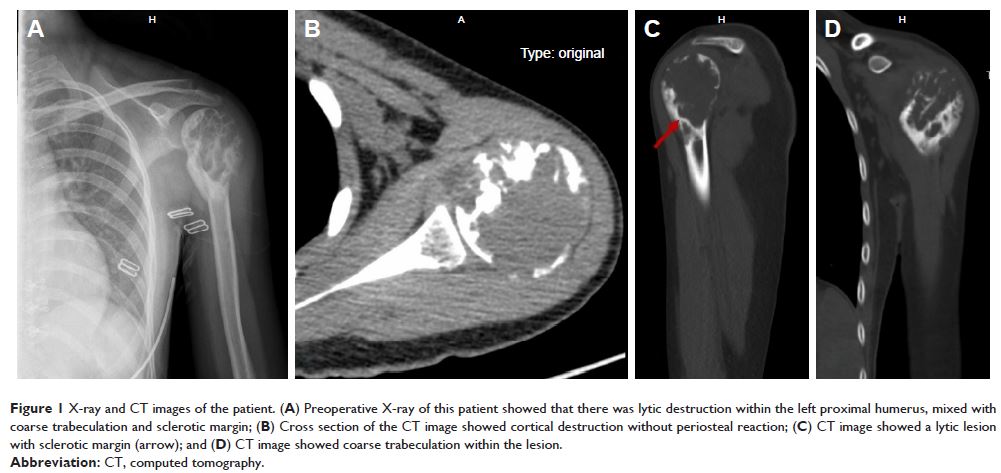108985
论文已发表
注册即可获取德孚的最新动态
IF 收录期刊
- 3.4 Breast Cancer (Dove Med Press)
- 3.2 Clin Epidemiol
- 2.6 Cancer Manag Res
- 2.9 Infect Drug Resist
- 3.7 Clin Interv Aging
- 5.1 Drug Des Dev Ther
- 3.1 Int J Chronic Obstr
- 6.6 Int J Nanomed
- 2.6 Int J Women's Health
- 2.9 Neuropsych Dis Treat
- 2.8 OncoTargets Ther
- 2.0 Patient Prefer Adher
- 2.2 Ther Clin Risk Manag
- 2.5 J Pain Res
- 3.0 Diabet Metab Synd Ob
- 3.2 Psychol Res Behav Ma
- 3.4 Nat Sci Sleep
- 1.8 Pharmgenomics Pers Med
- 2.0 Risk Manag Healthc Policy
- 4.1 J Inflamm Res
- 2.0 Int J Gen Med
- 3.4 J Hepatocell Carcinoma
- 3.0 J Asthma Allergy
- 2.2 Clin Cosmet Investig Dermatol
- 2.4 J Multidiscip Healthc

肱骨近端低级中心型骨肉瘤:一个罕见的实体
Authors Tang F, Min L, Zhou Y, Luo Y, Tu CQ
Received 29 May 2017
Accepted for publication 26 September 2017
Published 24 October 2017 Volume 2017:10 Pages 5165—5172
DOI https://doi.org/10.2147/OTT.S142818
Checked for plagiarism Yes
Review by Single-blind
Peer reviewers approved by Dr Giandomenico Roviello
Peer reviewer comments 3
Editor who approved publication: Dr Ingrid Espinoza
Abstract: Low-grade central osteosarcoma is a rare subtype of tumor with low-grade
malignancy. Currently, wide resection with negative resection margin is the
standard treatment for this disease. The role of neoadjuvant chemotherapy in
low-grade central osteosarcoma was controversial and was mostly considered for
tumors containing high-grade focal areas. Local tumor recurrences often
exhibited a tumor with higher histologic grade or differentiation with the
potential for metastases. In low-grade central osteosarcoma, timely wide
resection after definite diagnosis can result in 5-year survival for almost
90%. However, the relatively nonspecific radiological and pathological findings
make diagnosis very difficult. MDM2 and CDK4 are specific and provide sensitive
markers for the diagnosis of low-grade central osteosarcoma, helping to
differentiate low-grade central osteosarcoma from some benign lesions,
including fibrous dysplasia, bone giant cell tumor, and chondrosarcoma. Here,
we report the case of a 19-year-old woman with low-grade central osteosarcoma
located at the proximal humerus. The affected site was rare, but the sensitive
biomarkers CDK4 and MDM2 were positive. The patient recovered well after wide
tumor resection following a proximal humerus endoprosthesis replacement. Our
case highlighted the management strategies in low-grade central osteosarcoma.
Being familiar with radiographic features, understanding the biological
characteristics, and mastering diagnostic biomarkers can help oncologists avoid
embarrassing situations in treatment when this rare tumor is highly suspected,
even when located at an uncommon site. The discussion in this report focuses on
radiographic and pathological features, advances of biomarkers that help in
differential diagnosis, and current treatment options in low-grade central
osteosarcoma.
Keywords: low-grade
central osteosarcoma, proximal humerus, differential diagnosis, wide resection,
MDM2, CDK4
